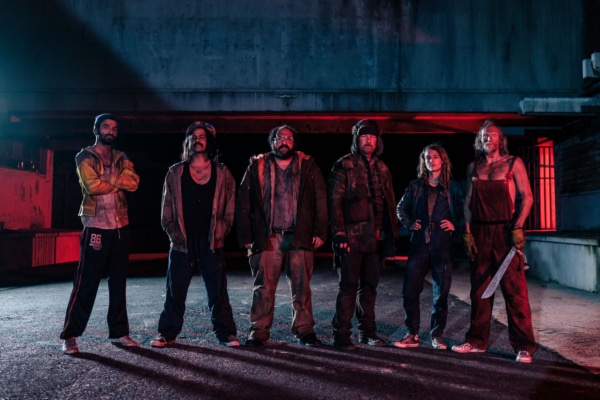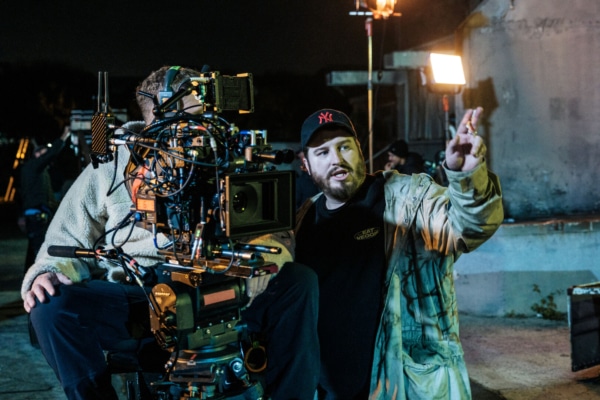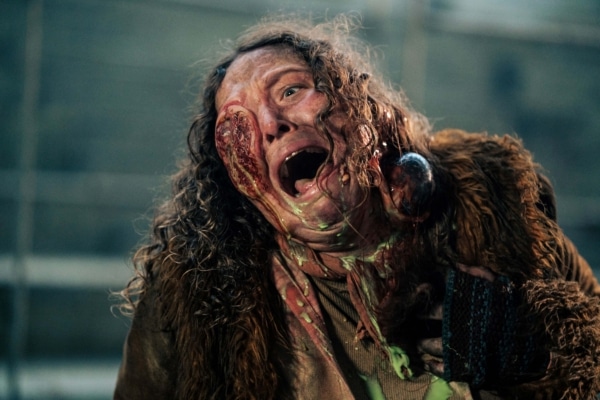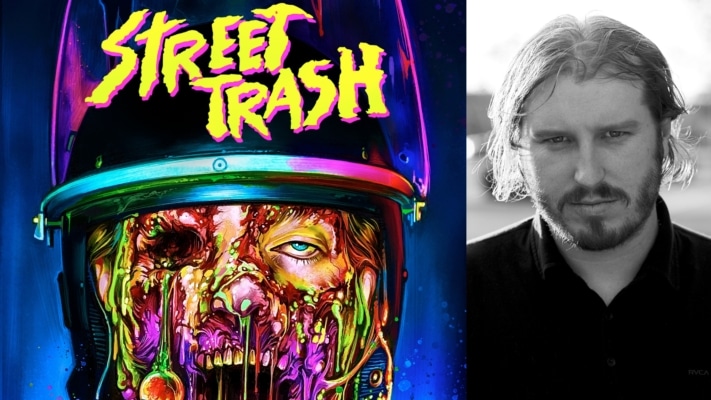James Muro‘s Street Trash is an acquired taste. In a true sense, the 1987 Dark Comedy/Body Horror is a cult classic. Regular movie watchers have probably never heard of it, but at least cinephiles and hardcore horror fans have it on their radar. The film’s story and gore struck many enough people to build a fanbase around it, including director Ryan Kruger. The filmmaker behind Fried Barry felt a strong enough connection that he answered the call when asked to tackle a remake/sequel/reimaging of Street Trash.
Producers Matt Manjourides and Justin Martell approached Kruger after the filmmaker finished his cult film, Fried Barry, about putting his spin on the horror film for new audiences. The filmmaker wasn’t hesitant to take the offer but wanted to ensure there was a reason for 2024 Street Trash to exist. When the deal was done, Kruger went to work creating the movie and adding something new and refreshing to the world Muro made over thirty years ago. We spoke with Kruger about his process in creating the story for 2024’s Street Trash, the film’s themes, and what horror classic he’s in talks to remake.
You’ve said in past interviews that Street Trash is not a remake; it’s a sequel to the original. How did you approach writing this film to make it something different without rehashing too much of the original?
Ryan Kruger: Yeah, I mean, when the producers first contacted me to do the film, I looked at it and—obviously, I was a fan of the original. So I was like, “Yeah, yeah, I’d love to do it, but I would want to do something different straightaway.” I’m not one for remakes. So, for me it’s like as a kid growing up in the 80s and watching any 80s film, specifically Street Trash, I don’t want to copy it. It has that nostalgia, and it’s a part of the time where it is, and it’s cool. I don’t want to change that. I love that. I’m one of the fans who like the original, so it was bringing something new to the table for me, but that makes sense in that same world. So, bringing the Viper back, but in a different way, bringing it to mean that it’s the government trying to get rid of the homeless. It’s the same but different in many ways, but it has the melts; it has the government melting people. So, it was important for me to come up with a completely different story. It’s in the same world for a new audience. It can be a standalone film for the original fans, and it’s definitely a sequel.
What was important was to have really cool 80s prosthetics. That was a big thing in the original film that we had to have. I didn’t want to do loads of CGI. It had to be in camera as the 80s lover. It was awesome to do a lot of these prosthetics. We don’t get enough films these days that have that. So that’s one thing I wanted to take from the original. Secondly, I wanted this story to be an overall stronger narrative. Then, on top of that, it was very, very important with any film that I do to have strong characters and characters that you enjoy and go on this journey with. So that was a big thing for me, and we have these fun-loving characters that you follow.

Yeah, definitely. So the movie is a very f**k authority, and it brings up class warfare—the rich versus the homeless. Were there any other ideas you were kicking around before you sat down and decided this was the story you would tell?
Ryan Kruger: I think I was lucky because, at the start, I had no idea what the story was going to do at all. I think the first thing that I knew when I got the idea the first thing I knew that I wanted a gang and to follow a homeless gang. I think that was probably the first thing that I got. Then put all these fun drug addicts, and I had these ideas that were, “Okay, we’re definitely going to have a gang.” Then, luckily, very, very early on, when I was kicking around the ideas, the whole government thing came to me, and it was more talking about getting those ideas. It was like, “What’s going on in the world?” We all went through Covid, we all went through the government saying, “You got to wear the mask, you got to take this, you got to take that.” So all that is actually in Street Trash is the government taking control. There was a lot of social commentary on that.
On top of that, the whole homeless problem, a lot of people lost their jobs during COVID, and the homeless thing is out of control in the whole world right now. I wanted to push that as the backdrop; we’re all living through that now. We’re all seeing that now. Even though it is a melt movie, don’t take it too seriously. There are social commentaries on it. With me, obviously, you can have a message behind stuff, and you can put it there, but at the end of the day, still, you got to come back and go, “It’s a f**king melt movie. It’s just a f**king movie.” At the same time, it’s okay to have a message. It’s okay to put that stuff out there, but you’ll get some people stuck on it going, “Oh, he is trying to do this whole social message thing or whatever.” It’s just a fucking movie. But yes, there are those little things in the background that don’t alter the story or the characters or anything else. It’s like, “Yeah, governments can be crazy.”
Street Trash reminded me of a story from New York about Rudy Giuliani, the mayor at the time, and how he got rid of the homeless. There are a lot of very conspiratorial ideas about how he solved the city’s homeless problem and how the government will go to those great lengths. So your style of filmmaking is unique and has been part of this 80s vibe with a gore flair movement for the past decade. It seems ripe for the possibility of another Street Trash movie.
Ryan Kruger: Everybody’s saying this; everybody wants another one. Everybody has been saying, “Oh, there’s got to be a number two, there’s got to be a number two.” I don’t know if there is going to be a number two. It seems like everybody wants a number two, but again, it’s coming up with the right story, and it has to relate to the one I’ve just done. So it’s got to be like with anything, it’s got to be the right story to work.
Your filmography leans into the horror realm, and now you have the sequel to the cult classic Street Trash. The original is gaining traction, and people are rediscovering the film. Is there another cult classic movie you want to tackle or a more prominent horror franchise?
Ryan Kruger: There has been talk of Frankenhooker. There has been talk about that.
Oh really?
Ryan Kruger: So I don’t know if that’s going to happen or not, but yeah, it seems like there’s some interest in there. But I don’t know, we’ll have to see. I love all genres. I don’t want to get stuck into one genre. I look at influencers and people I like—whether it’s Spielberg, Kubrick, David Lynch, or Cronenberg. I love all film styles, so I also don’t want to get locked into certain things. I could say Street Trash and Fried Barry are kind of in the same world. I would say Fried Barry is a little bit darker and more experimental, and Street Trash is a little bit more open to a bigger audience, I guess. I like to do different things. The other thing is you can look at Terminator 1 and Terminator 2. Terminator 1 has more of a horror element and is darker. Then Terminator 2 is a little bit more commercial, and Arnie’s the good guy. It’s two very different films.

I barely watched Frankenhooker sometime this year. That movie could definitely be remade today. Obviously, with a more defined look at the Me Too movement or a commentary on women’s rights. I think it would work now in a much bigger way. What was the process of creating the unique prosthetics in Street Trash and keeping the gore in the film from becoming stale?
Ryan Kruger: It’s important to get those prosthetics, like anything in a movie you make. There’s a lot of planning and a lot of detail that goes into every scene or moment. So, with this film, we had to tick those boxes, of course, with the prosthetics, plan those out, sit with the prosthetic guys, and go, “Can we do this? Can we do that? How are we going to do this?” So yeah, it’s a process.
Street Trash is available to rent on VOD services.

